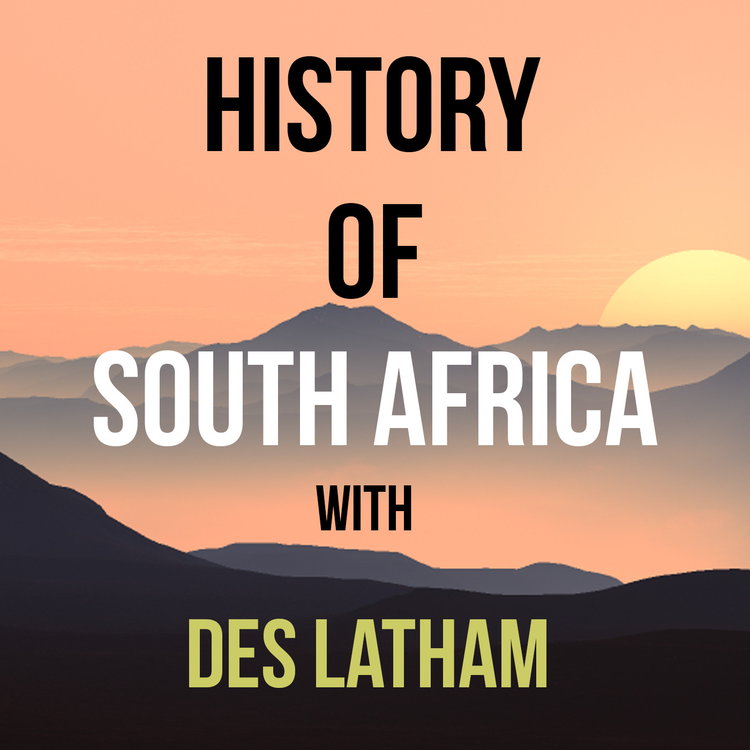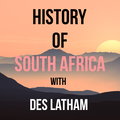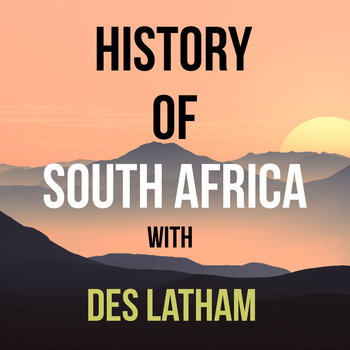
EPISODE 128 - Dingane smells blood and Retief leads the United Laagers
Loading player...
This is episode 128 and the bell is tolling for Mzilikazi Khumalo of the amaNdebele. We’ll also hear about the introduction of Maize by hunter-traders, and the relationship between Dingane and the Portuguese at Delagoa Bay.
A compounding problem for Mzilikazi was how he’d treated the indigenous Sotho speaking people of the area north of the Vaal. He’d failed to assimilate them into his system of control completely, rather using some as Hole, who were basically domestic and community menials — servants.
Others who were overcome by his warriors were assigned to villages of their own where they herded cattle for him under traditional chiefs but under surveillance of an Ndebele regiment and sometimes, one of his wives. There were those allowed more freedom to pursue their lives automously but paid a tribute. All of this meant that they weren’t his allies, which also meant when the Boers rolled onto the veld, the Sotho viewed them Boers with antipathy, wary but not always as enemies.
Mzilikazi had a community of 60 000 people — possibly 80 000 say historians, but only a tiny percentage of these were warriors, perhaps 4 000 in total at the apex of his power.
Mzilikazi was, in a word, a despot. But a complicated despot. Mzilikazi demanded a strict adherence to Nguni and Khumalo traditions.
Meanwhile, at Blesberg near Thaba ‘Nchu, the Voortrekkers had elected Piet Retief as the new governor and commandant general of the new Volksraad of April 1937. Potgieter had been replaced by Retief, but had no intention of relinquishing power.
This is where the almost reverend Erasmus Smit enters our story once more. He met with Retief who told him that the following Sunday he would be formally inducted as the custodian of the Voortrekkers spiritual needs, he would become a full dominee.
It would take place, said Retief, after Smit’s sermon. So on the Sunday Smit duly delivered his sermon then waited for the commander to make the announcement. Instead, and to his horror, members of the Volk stood up and shouted objections to his appointment.
The humiliation complete, Retief cancelled the inauguration and poor meneer Smit retired to his wagon to quaff a few brandies no doubt. Shattered and disappointed, he was visited by Retief that night who said that they would eventually have to announce him as dominee, because the Voortrekkers were still relying on the Wesleyan missionaries and the American missionary Reverend Daniel Lindley for their marriages, baptisms and funerals.
And speaking of the English, they were indeed beginning to view Port Natal with more interest.
While Cape Town and Port Elizabeth remained far more important, the hunter traders at Port Natal nagged the governor to consider annexing Natal as a new colony.
Their overriding motives were economic and traded hides, furs, Ivory, tallow, horns and plant oil and these folks were linked directly to the British financiers who put up the money for their exploration and their exploits. These hunter traders were the first external group or class of individuals to respond to economic opportunities and the political risks that lay in exploiting the natural wealth of Natal and Zululand.
Most of the hunter-traders like Henry Francis Fynn had gone to far as to marry into Zulu society so valuable was this opportunity.
A compounding problem for Mzilikazi was how he’d treated the indigenous Sotho speaking people of the area north of the Vaal. He’d failed to assimilate them into his system of control completely, rather using some as Hole, who were basically domestic and community menials — servants.
Others who were overcome by his warriors were assigned to villages of their own where they herded cattle for him under traditional chiefs but under surveillance of an Ndebele regiment and sometimes, one of his wives. There were those allowed more freedom to pursue their lives automously but paid a tribute. All of this meant that they weren’t his allies, which also meant when the Boers rolled onto the veld, the Sotho viewed them Boers with antipathy, wary but not always as enemies.
Mzilikazi had a community of 60 000 people — possibly 80 000 say historians, but only a tiny percentage of these were warriors, perhaps 4 000 in total at the apex of his power.
Mzilikazi was, in a word, a despot. But a complicated despot. Mzilikazi demanded a strict adherence to Nguni and Khumalo traditions.
Meanwhile, at Blesberg near Thaba ‘Nchu, the Voortrekkers had elected Piet Retief as the new governor and commandant general of the new Volksraad of April 1937. Potgieter had been replaced by Retief, but had no intention of relinquishing power.
This is where the almost reverend Erasmus Smit enters our story once more. He met with Retief who told him that the following Sunday he would be formally inducted as the custodian of the Voortrekkers spiritual needs, he would become a full dominee.
It would take place, said Retief, after Smit’s sermon. So on the Sunday Smit duly delivered his sermon then waited for the commander to make the announcement. Instead, and to his horror, members of the Volk stood up and shouted objections to his appointment.
The humiliation complete, Retief cancelled the inauguration and poor meneer Smit retired to his wagon to quaff a few brandies no doubt. Shattered and disappointed, he was visited by Retief that night who said that they would eventually have to announce him as dominee, because the Voortrekkers were still relying on the Wesleyan missionaries and the American missionary Reverend Daniel Lindley for their marriages, baptisms and funerals.
And speaking of the English, they were indeed beginning to view Port Natal with more interest.
While Cape Town and Port Elizabeth remained far more important, the hunter traders at Port Natal nagged the governor to consider annexing Natal as a new colony.
Their overriding motives were economic and traded hides, furs, Ivory, tallow, horns and plant oil and these folks were linked directly to the British financiers who put up the money for their exploration and their exploits. These hunter traders were the first external group or class of individuals to respond to economic opportunities and the political risks that lay in exploiting the natural wealth of Natal and Zululand.
Most of the hunter-traders like Henry Francis Fynn had gone to far as to marry into Zulu society so valuable was this opportunity.

